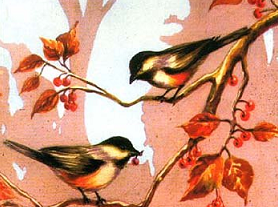dva suparna sayuja sakhaya – Shloka
There is shloka mentioned is Mundaka Upanishad 3.1.1, which mentioned Jiva and Ishvara as two birds sitting on same tree. Where one bird ( Jiva) does actions and enjoy worldly pleasures and other bird (Ishvara) mere exists and does nothing.
द्वा सुपर्णा सयुजा सखाया समानं वृक्षं परिषस्वजाते ।
तयोरन्यः पिप्पलं स्वाद्वत्त्यनश्नन्नन्यो अभिचाकशीति ॥
English Meaning:
Two birds, inseparable companions, perch on the same tree,
one eats the fruit, the other looks on. The first bird is our
individual self feeding on the pleasures and pains of this world;
The other is the universal Self, silently witnessing all.
Hindi Meaning:
दो पक्षी, अविभाज्य साथी, एक ही पेड़ पर आश्रय करते हैं,
एक फल खाता है, दूसरा केवल देखता है।
पहला पक्षी हमारा व्यक्तिगत स्वयं है जो अपने कर्म से सुखों और दुखों का भोक्ता है;
और दुसरा सनातन स्वयं है, जो मौन रहकर साक्षित्वरूप से सब कुछ देख रहा है।
Story of Two birds – Mundaka Upanishad
Two birds living together upon the same tree. Of these two, one eats the sweet fruit of the tree, but the other simply looks on without eating.
The two birds are the Jiva and Isvara. They exist together as the reflection and the original.
That which distinguishes the Jiva from Isvara is the mind. Jiva is affected by Avidya, Kama and Karma. Because of the conjunction of consciousness with these limiting factors, it has to experience the results of its actions;
Isvara, is not limited, has no actions to perform and no experience of the results of actions. The fruits enjoyed by the Jiva are of the nature of pleasure and pain, i.e., they are all relative experiences born of non-discrimination.
The experience of Isvara is eternal and is of the nature of purity, knowledge and freedom.
The value of His existence is greater than that of the activity of the whole universe. It is His existence that actuates the whole universe of manifestation.



















